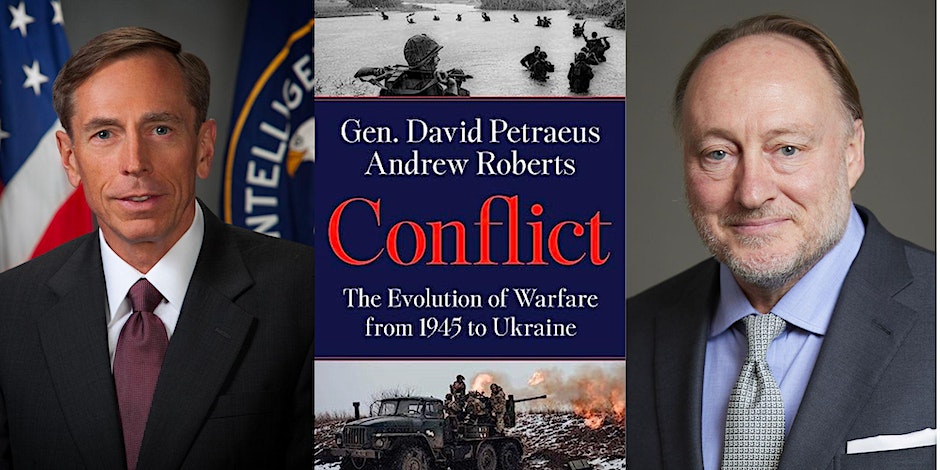
David Petraeus is a retired United States General who served in Iraq and Afghanistan. Andrew Roberts is biographer and historian specializing in warfare and those who conduct it (his books Churchill: Walking with Destiny and Napoleon: A Life are great!). So these two experts explore the major wars from 1945 to the Ukraine war. They just missed the Israel-Hamas war.
“Never, never, never believe any war will be smooth and easy, or that anyone who embarks on the strange voyage can measure the tides and hurricanes he will encounter. The Statesman who yields to war fever must realize that once the signal is given, he is no longer the master of policy but the slave of unforeseeable and uncontrollable events. Antiquated War Offices, weak, incompetent or arrogant commanders, untrustworthy allies, hostile neutral, malignant Fortune, ugly surprises, awful miscalculation–all take their seats at the Council Board on the morrow of a declaration of war.” (Winston Churchill, My Early Life (1930), p. 235)
Petraeus and Roberts show every word of Churchill’s warning about war came true in the Korean War, the Vietnam War, and Gulf War, and especially the United States’s longest war, Afghanistan. William Tecumseh Sherman famously said, “War is hell.” The section of Conflict dealing with the Ukraine proves Sherman’s assessment with plenty of proof. Not only did thousands of Ukrainian civilians die in the indiscriminate bombing, shelling, and drone attacks the Russians unleashed against them, the Russian invaders also encountered death and destruction: “There were also stories of Russian solders sabotaging their own vehicles’ gas tanks in order to avoid reaching the front line, a classic example of the demoralization of young conscripts who had been told they would be greeted as liberators but were instead experience almost universal hostility and loathing.” (p. 376) There were also reports that Russian officers were shot in the back by their troops.
Time after time, Petraeus and Roberts illustrate the pressure politicians put on the military to engage in warfare without knowing the risks. “[General Colin] Powell bristled when Madeleine Albright, the US Ambassador to the UN, snapped at him, “What’s the point in having this superb military you’re always talking about if we can’t use it?” (p.215). Mission creep and quagmire wars result from this kind of thinking.
The savagery and cruelty of war shows up again and again. Take the Iraq-Iran War in the 1980s. “Ayatollah Khomeini sent unarmed teenagers to certain death with instructions to pick up the rifle of the boy who fell in front of them… The Ayatollah gave them small metal keys that he promised would gain them admission to Paradise when they were martyred. Many were bound by ropes to prevent their desertion.” (p. 176) Hundreds of thousands of young people died in this conflict.
Getting into a war is easy, getting out is hard. “It is no coincidence that the United States lost its two longest wars–those in Vietnam and in Afghanistan. In both countries, it propped up unpopular and corrupt regimes…and was defeated by enemies enjoying cross-border sanctuaries and fighting to tire the American people and force the withdrawal of US armed forces from the conflict.” (p. 277). All wars cost lives and extended conflicts become money pits.
Conflict chronicles the major wars over the past 75 years with successes and failures. Petraeus and Roberts conclude by predicting what future wars will look like. Welcome, Terminators! GRADE: A
TABLE OF CONTENTS:
Introduction — 1
1 The Death of the Dream of Peace, 1945-1953 — 5
2 Wars of Decolonization, 1947-1975 — 37
3 America’s War in Vietnam, 1964-1975 — 77
4 From the Sinai to Port Stanley, 1967-1982 — 135
5 Gold War Denouement, 1979-1993 — 169
6 The New World Disorder, 1991-1999 — 207
7 The War in Afghanistan, 2001-2021 — 235
8 The Iraq War, 2003-2011 — 279
Appendix A Security Incidents in Iraq, January 2004-August 2008 — 341
Appendix B Headquarters, Multi-National Force, Baghdad, Iraq, 15 July 2008 — 342
Appendix C Anaconda Strategy versus al-Qaeda in Iraq, September 2008 — 348
Appendix D The Battle of Sadr City, March-April 2008 — 349
9 Vladimir Putin’s Existential War against Ukraine, 2022 — 350
10 The Wars of the Future — 405
Acknowledgments — 443
Maps — 445
Bibliography — 457
Notes — 475
Index — 519
https://en.wikiquote.org/wiki/William_Tecumseh_Sherman makes a useful, rather quick read. While this sounds like a useful volume. Always knew there was somehing not all right with Albright, and not her alone.
Todd, CONFLICT is full of stories about the generals and politicians who struggled with the Vietnam War, the Gulf War, and of course, Afghanistan. I learned a lot from reading this book.
Re the Vietnam War and the US participation.
We German students in the 60s demonstrated regularly and I still remember the slogan that we sang:
LBJ, LBJ, how many kids did you kill today?
Those wars were really crazy!
Wolf, the Vietnam War was senseless. The whole “Domino Theory” that “justified” it became debunked. As Petraeus points out, the U.S. Military fought a “conventional” war against a guerrilla campaign…and lost.